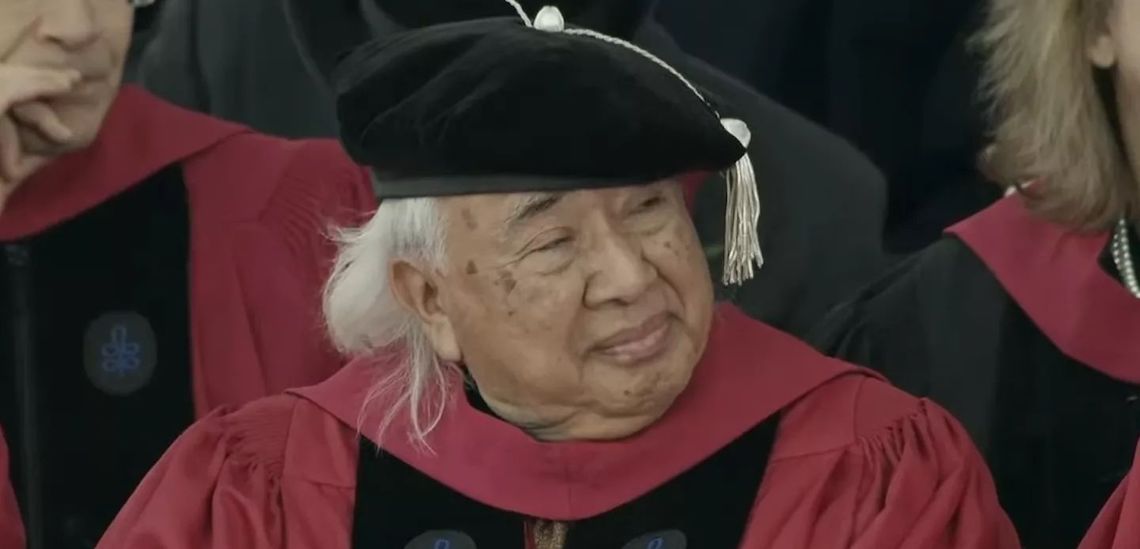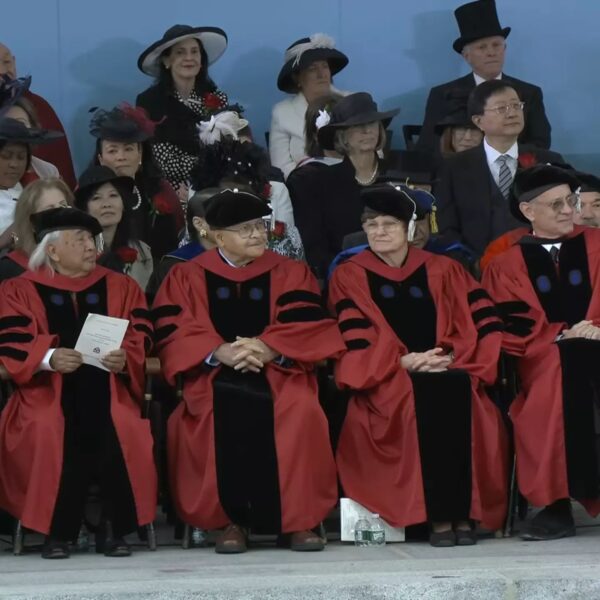From Oaxaca to Harvard to Fresno: Hugo Morales’ journey reflects lifetime of airwave advocacy

Hugo Morales graduated from Harvard in 1972 and completed Harvard Law in 1975. In May, he returned to Cambridge, Massachusetts, for an honorary doctorate. Photo contributed by Radio Bilingue
Written by Estela Anahi Jaramillo
A letter from the president of Harvard University arrived at Hugo Morales’ home recently. As an alum, mail from the school was not uncommon.
Morales’ wife passed the unopened envelope to him. When he read the personal letter from the president, Morales was taken aback to learn he was receiving an honorary doctorate.
“The Harvard community was watching what I was doing, so that was so groundbreaking and amazing to me,” said Morales, the founder of Fresno-based Radio Bilingüe. “But it’s really a team effort. You know, they really have made it impactful.”
Early start
As a Harvard student, Morales reserved a couple of hours at the university’s radio station to start the first-ever university radio show by and for Latinos nationwide.
Morales is the third Mexican and the first indigenous individual to receive an honorary doctorate. The president and administrators made this experience unique and memorable for Morales.
At a dinner before the commencement ceremony last month, the president introduced each honorary doctorate and shared the accomplishments of each individual. As the president introduced Morales, the student mariachi group came in, playing “La Negra” for his recognition.
He received his honorary doctorate in Memorial Hall, a building that started what Morales would soon bring to the Valley.
“In that basement of the building is where the radio station was at that time when I was doing the radio show at Harvard,” said Morales.

Making airwaves
Aside from creating a platform for Latino voices at Harvard, Morales’ ties to radio date back to his childhood. He would join his brother at a radio station in San Francisco, the only Spanish radio north of San Francisco.
After immigrating to the United States, Morales came to a labor camp in Sonoma County. He recalled the music that would play on the radio as he worked with his family members in the fields. His father was also a musician, influencing his love for Latino music.
Various aspects paid tribute to the birth of Radio Bilingüe; aside from his love for Latino music, Morales’ love for community outreach and service stemmed back to his village in Oaxaca, Mexico — and the traditions common in Mexico’s indigenous community.
“It is enforced for able-bodied citizens of the village to volunteer,” said Morales. The tradition is called “tequio.”
Combining the two, he wanted to create a tool for underrepresented communities. He came to Fresno, where he knew his work and collaborations would leave an impact due to the large number of labor workers.
Roots in radio
Former California Assemblymember Juan Arambula and his wife Amy guided Morales on how to jump-start this idea as a nonprofit. Arambula served as the first anchor, informing Spanish-speaking communities about what was happening in the Central Valley.
Their first home was on the fourth floor of the Mason Building of the Fulton Mall in Downtown Fresno. Its 16,000-watt transmitter, located on Eshom Point in the Sierra Nevada, reached the Latino communities living in the Central Valley between Merced and Bakersfield.
Radio Bilingüe came to life in 1976, serving the region daily with news and music. Today, with 25 stations, Radio Bilingüe has a platform of around half a million listeners from Arizona, California, New Mexico and Texas.
“I also noticed that other communities had difficulty maintaining their bilingual radio services. And that’s why we began to expand, particularly after 2000. We expanded to cover many more communities,” Morales said.
Their current operating budget is $3.6 million, raised from foundations, government agencies, nonprofit partners, businesses, individuals and the Corporation for Public Broadcasting.
Its funders include the Robert Wood Johnson Foundation, The California Endowment, the David and Lucile Packard Foundation, the National Endowment for the Arts, the California Arts Council, the California State Health Department – Tobacco Control Section, and many others interested in informing hard-to-reach, low-income Latino populations in California and across the U.S.

Humble beginnings
Morales grew up in a village where there was no running water or plumbing. His mother would weave hats for a living to feed him and his siblings.
At three, Morales was fortunate enough to start his education journey. He attributes his academic success to his early start in education. His discipline with school and in his community helped him have a smooth time assimilating when he arrived at 9-years-old.
When he arrived in Healdsburg in Sonoma County, the first thing he noticed was the number of cars he saw in every direction.
Morales’ teachers in his early education helped him succeed and learn the new language. Before entering junior high, Morales was diagnosed with tuberculosis.
He spent a year in a sanitarium in Santa Rosa, 12 miles from Healdsburg. He was homeschooled for a year but finished his work three weeks into the school year. From then on, Morales studied newspapers and magazines and learned more about the world his family moved to just years prior.
“I was not in a junior high setting. I was an adult setting, with access to information that adults had,” Morales said. “I had to advocate for myself. I had to navigate and try to figure out the system by myself. So that’s what I did.”
Tequio at work
During his time there, he also discovered that his family was in poverty. That influenced him to later volunteer in advocacy for Latinos and lower-income families around California.
Morales would volunteer in Fresno for a time, which would then influence his decision to move here in the future.
Morales pays the organization’s success to the Radio Bilingüe team today, from staff to volunteers. Samuel Orozco, a journalist with Radio Bilingüe, has helped share stories and influence the community since 1981.
“He’s an outstanding journalist. But he also has a good sense for music and sets the organization’s tone, both on broadcast and as an organization,” he said.
His hope for the organization’s future includes getting a new space for the facility. To be more supportive of staff and have adequate working space. He also hopes to reach out to a younger audience to create the next leaders in the community.








